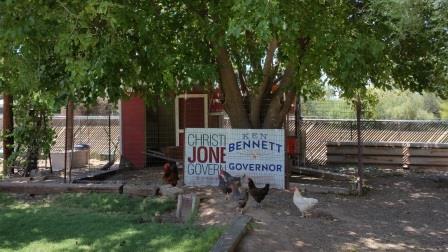Interview with Tina and Bruce Leadbetter of Stone Hoe Gardens on the history of the farm, how they manage their dairy goats, how to start a farm business, and how farm businesses evolve.
(Kari) I’m here with Tina and Bruce of Stone Hoe Gardens in Phoenix, AZ to talk about how to start a farm business. Tina, can you tell me about the history of your farm name, and why you selected that name when you started your farm?
(Tina) We have this wonderful property in the south Phoenix area that is just south of the Salt River. This area has been inhabited by native peoples for a very, very, very long time. When the current neighborhood was developed back in the 1950s or 60s, they plowed the road in front of our farm and turned up thousands of stone hoes left behind by a Native American village that was in this area. It seems that there were farms here for hundreds of years before we came. We named the farm after this discovery and all of the stone hoes that were found in the road.
Why did you decide to start a farm business?
We have 2 acres and we moved here in 2006. I had always been a city girl. But once we moved here, Bruce said to me that he wanted to get chickens. What? And so that was kind of the way the whole thing started. We got half a dozen hens and proceeded to have eggs. You should’ve seen the suspicion with which I approached our new hens’ eggs the very first time. I was almost afraid of them! I certainly don’t know why, looking back now. It’s laughable because I refer to eggs you can buy in the store as fake eggs. They don’t look anything like our farm eggs. We raised hens for a couple of years, and over time we talked about the different opportunities that we had here.
What were some of the challenges that you experienced to start a farm business?
We’re trying to find the best fit for us. We have always had some gardens here and at the last home. So, we were always growing some food – extraordinary amounts of food! Then conversation arose one day with our next-door neighbors about potentially acquiring their pasture. We considered that goats that would be really terrific because of the advantage of irrigated land in the city. But we don’t want to raise sheep on it necessarily, which is what the neighbors do on Bermuda grass pasture. – Bermuda grass – that’s a little bit of a challenge, which is probably understating one of the biggest challenges that we could possibly have!
Did anyone help you to start a farm business?
Bruce and I have been fortunate enough to meet Greg Peterson (UrbanFarm.org) some years prior to this. We sat down with him one day in 2011 and said that we want to grow vegetables. After rolling his eyes at us a little bit because it was gonna’ be a bit of a tough thing to do, he introduced us to a unique growing technology called VermiSoks. This presented a really awesome opportunity for growing food. So we jumped in with both feet. We were one of the first off-site growers for VermiSoks as they were in development. It was a wonderful technology that was 100 % recyclable, using food waste to feed the land. This system was a 100% sustainable, a really fantastic technology that grew amazing food. The company is having its growing challenges, but we hope that we’ll see it continue at some point the future.
How did Vermisok’s business problems affect your farm?
When VermiSoks shut down in 2012, we transferred our gardens from this unique technology over to a traditional growing system. We expanded from vegetables production into raising goats in early 2014. We are in our fourth year of operation now and still ironing out the kinks and figuring what we are going to do next.
What are you growing and raising at Stone Hoe Garden?
(Tina) We have just over 2 acres of land and have a wide range of things that we grow and raise. In the livestock department, we raise dairy goats and chickens for eggs. We also grow fruit, vegetables, herbs and flowers. There are citrus trees, stone fruit trees, pomegranate trees, pecan trees and other types of nut trees on the property. We have extensive vegetable gardens and are able to grow all year round because Phoenix is a four season growing town.
This may seem contrary to the desert climate, but we grow food all year long. We also raise herbs and flowers, and we’ve got pretty much most of your standard kitchen herbs like basil and thyme, oregano and marjoram, rosemary and just all of the regular cooking herbs, as well as a few of the more obscure ones, like tarragon.
Why do you grow flowers?
There are some flowers growing just because they’re beautiful, but I like to focus on the edible flowers to because there’s one thing that we try to ask ourselves anytime we’re going to plant something here: Is it food? That’s one rule for any new thing that gets planted here. Otherwise, it has to either have been growing here before we bought the property, or it is a good for pollinators.
(Kari) What are some of the challenges to growing food or raising food in Phoenix?
(Tina) The weather is a big one. It’s really, really hot here in the summertime. And although some plants like full sun, that doesn’t mean that they won’t get sunburned and beaten down by the blasting heat if they are left in the direct sun all the time. So finding ways to grow food in the summertime is probably one of our biggest challenges growing. The summer temperatures up to 115 degrees in the summer are just as bad as brutal sun beating down on our garden. It is really hard to mitigate.
How do you protect plants from summer heat and sun?
Even if a plant wants full sun, I still try to find a way to provide it a little bit shade in the hottest part of the day. We try to take advantage of permaculture here on the property. The farm has a lot of trees, especially on the perimeters. I try to plant on the east side of the bigger trees so that when the sun is in the western sky in the afternoon, we have more shade that falls across the garden. That seems to be working fairly well.
Tell me about using shade cloth for desert gardening.
We’ve also erected canopy structures on which we put shade cloth. The sunblock percentages will vary in different types of cloth. So you can choose to block as much as 90 % of the sun for some plants, and only block 30 % of the sun for others. Different vegetables will do better under different covers. The first year I was trying to grow peppers under cover that was so dark that it just really didn’t work well.
The winter time in Phoenix is usually a blessing. Our weather in the winter is temperate. We don’t often see temperatures below freezing, and if we do, it’s just a quick little bit. It’s not long, extended freezing temperatures. Since we are blessed with a lot of sunshine all year long, we do well in wintertime. Spring and fall are really good times for growing.
What other challenges do you face?
Water is probably the second biggest challenge here in the Phoenix area because we do live in a desert. We need to be sensitive to the idea that our city is growing so quickly. We’re fast outstripping the groundwater that’s available here now. On our property, we do have the amazing blessing of flood irrigation, which most people do not have access to. But flood irrigation is a mixed bag because you can’t irrigate three or four times a week. It is just not feasible to water vegetable garden stuff only twice per month.
How do you supplement irrigation?
We use city water to supplement the irrigation, which has its downside in the sense that it’s treated and it is expensive. You also have to have some way to distribute city water. We selected drip tape with conservation in mind because its efficiency should be 90 to 95 %. I like that because flood irrigation, by comparison, is only 70 % efficient. This means that only about 70 % of the water that you put on your earth via flood irrigation goes to actually growing your plants. The rest of it is kind a waste. So I tried to be as efficient as possible with drip tape.
Would you recommend drip tape to someone who wants to start a farm business?
The drip tape distributed water well for the plants. But it didn’t work so well with all of the other environmental factors, like rabbits, gophers and birds. Bees line up on top of the drip tape to get water, which is great. But, we also have rabbits biting through the drip tape to make their own personal drinking fountains, which they didn’t remember to shut off when they were finished drinking! We will bury the drip tape under the soil to deter the rabbits.
One upside to drip irrigation is that you can install a controller so it waters things automatically. This is nice if you’re not attending your farm all day every day. But it still has its complications; you have to make sure you keep them in good repair. Use a pressure reducer to keep the water pressure from blowing the lines.
(Kari) Tell me a little bit about your goats and some strategies that you’ve used to start a farm business and make milking and caring for your goats easier.
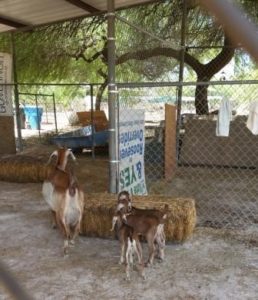 (Tina) Bruce and I have Nubian goats that produce an awful lot of milk. We bought two new does, one who had just come into milk by virtue of giving birth 30 days before we bought her. And then we bought the second one who was bred. She gave birth two weeks after we got her. So pretty much right as we got the goats, they were in milk and we were milking! This is very first time I had ever tried that. It was pretty funny watching me learn how to milk. We knew that the way to get the most milk out of our goats was to milk them twice a day, morning and night.
(Tina) Bruce and I have Nubian goats that produce an awful lot of milk. We bought two new does, one who had just come into milk by virtue of giving birth 30 days before we bought her. And then we bought the second one who was bred. She gave birth two weeks after we got her. So pretty much right as we got the goats, they were in milk and we were milking! This is very first time I had ever tried that. It was pretty funny watching me learn how to milk. We knew that the way to get the most milk out of our goats was to milk them twice a day, morning and night.
What strategies do you use to make milking easier?
One thing goats like is when their world is routine. So having routines is definitely a way to make your life with goats easier. Milk them at the same time in the same place; feed them in the same places. They’re friendly animals and it so is easy to establish those habits.
How did having goats impact your farm business?
It was a little hard to imagine ahead of time the impact that goats would have on our farm life and our personal lives. One of the things that we discovered is that milking goats twice a day is great for getting a lot of milk. We get an average of maybe 10 gallons of milk a week when our does are in milk. But, we found that there were little things that really had to be worked out. For example, do the goats need to be milked at the same time that your favorite yoga classes? Or, “Hey, let’s go out to dinner with her friends on Wednesday night…” That’s fine but we have to wait until after that it’s time to milk the goats before we can go out to dinner So they definitely bring it routine challenges into the timing in your own schedule.
How do you house your goats?
They are also crafty animals. Make sure that you have the right containment system for them, the right feeder, the right pasture situation. They are curious and they will get out, so you can’t use standard fencing with them. For example, if you use hog wire fencing, they will actually get stuck in it. Fencing needs to be a certain height because they’re jumpers. They’re curious. If there is something to near the fence, they can and will use it to get over the fence. I had an experienced farmer tell me one time that if you’d like to know whether or not a goat will get through your fence, throw a glass of water on it. If the water goes through, the goat will get through. I think that’s probably a little extreme, but it was a good warning.
(Kari) Tell me what works with your management and what you will tell a new farmer about how to start a farm business.
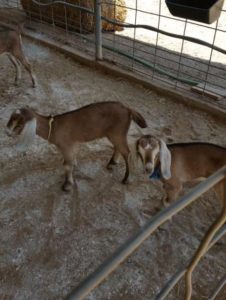 (Tina) We were fortunate to have a stable here on the property that we just had to modify. To make it secure, we put some pretty tall chain-link fencing around it that we already had on property because we try to use the resources that are here. We use 5 foot and 6 foot tall chain-link fencing to enclose our goat pen, and that has worked pretty well. The fencing could be a little bit sturdier because it goats like to rub against it. Even though it seems pretty sturdy, they’ve actually rubbed saggy spots right into the middle of the chain-link panels.
(Tina) We were fortunate to have a stable here on the property that we just had to modify. To make it secure, we put some pretty tall chain-link fencing around it that we already had on property because we try to use the resources that are here. We use 5 foot and 6 foot tall chain-link fencing to enclose our goat pen, and that has worked pretty well. The fencing could be a little bit sturdier because it goats like to rub against it. Even though it seems pretty sturdy, they’ve actually rubbed saggy spots right into the middle of the chain-link panels.
How do you keep goats from breaking the fence or getting out?
We could probably mitigate that by installing a couple more fence posts. We pasture them to give them the opportunity to rub on other things, like trees or some wood. Making sure that the gates are very securely latched is important and something that isn’t that simple. Pop up latches don’t work because goats figure out how to pop those up and go through. They figure out how you got in to the pen, and they will get out the same way.
(Kari) Bruce, tell me some of the most fun and profitable things that you do on the farm.
(Bruce) Fun and profitable to me coincides with money and the stuff that sells the most, as well as the creativity. I really enjoy making cheese with our goat milk. No matter how much we drink or give away to friends, we inevitably end up with gallons of goat milk. I decided to start trying to make cheeses. At first, I got into the soft cheeses which have some complexities. In reading and studying about them, and then trying it, sometimes you make a great batch. Other times, you try figure out why it didn’t turn out. Then you start getting better; you start learning how to make better batches of cheese. And I think that’s what I really enjoy the most.
Do you also create products out of your farm fresh eggs?
As for the chickens, I had great eggs growing up and we never seem to suffer here for good eggs. I’m still trying to figure out the creamy texture of a frittata. Maybe it needs a water bath… I’m trying to get the right texture without too much cream. (I would interject that Bruce is a fantastic cook, and he enjoys experimenting in the kitchen. We have been served many a delicious dish in the Stone Hoe Gardens kitchen!)
(Kari) How do you sell your products?
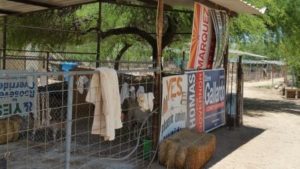 (Bruce) We had some limited success selling stuff restaurants, but could never produce enough. We were using a growing method called VermiSoks, which was a way of growing food and it was so easy. But the VermiSoks technology isn’t available right now and there was such a steep learning curve from the hobby grower to the commercial food producer mentality. It became in overbearing responsibility and took the fun out of it.
(Bruce) We had some limited success selling stuff restaurants, but could never produce enough. We were using a growing method called VermiSoks, which was a way of growing food and it was so easy. But the VermiSoks technology isn’t available right now and there was such a steep learning curve from the hobby grower to the commercial food producer mentality. It became in overbearing responsibility and took the fun out of it.
— But, as a result, we decided to just pull back and have fun with it. Whatever we were growing at the time, we posted in our newsletter. And the customers started showing up. You know, I think the lack of that negative energy made the difference.
(Kari) How did you start a farm business by using volunteers?
(Tina) We are very fortunate in having a dedicated team of people who have an interest in what we do here to the extent that they want to participate. Some volunteer with everything that we do: vegetables, compost, chickens, and goats. Some volunteer in specific sections. For example, we have some volunteers that are really just interested in the goats. It’s a really great trade-off to mitigate the amount of work that goes into a farm.
What do volunteers get in return?
It’s an opportunity for our volunteers to be able to see what works and what doesn’t work, and how we try things. They also get a little bit of personal experience if they plan to start a farm business doing similar things in the future. Some of our volunteers are being very smart about learning this lifestyle before they try to set up their own system. Others volunteer because they can’t have goats at home, so they have goats here. Or they can’t grow a vegetable garden because they live in apartment, so they get that experience here. It’s up to the volunteer. These arrangements have really worked out very well for both parties.
(Kari) How do you find your volunteers?
(Tina) My volunteers find me for the most part. And we find them through unusual methods. Most of the time, it has been friends of friends recommending people to us. We’ve had some people who I’ve met at various farming seminars who have said, “Oh, you have a farm. I would love to volunteer!” Some people have just found our website and called us out of the blue. I had an older gentleman call me one time and say that he used to work on a farm in Minnesota for 30 years and I know some stuff about farming. I’m consistently amazed at how our volunteers find us. On our new website that we just created, we are specifically putting it out there that we want and welcome volunteers here. We have made some great personal relationships with these wonderful people who have given their time and effort here.
(Kari) You have shown us good examples of how to start a farm business. What are your future plans for the farm?
(Tina) I want to expand our farm by adding bees and rabbits, because I think those are the two segments that interest me most in moving forward. But I don’t want to just drop a stack of hives down without the right personal protection equipment and knowledge. I contacted a local apiary, and because we have room here, they are going to bring some of their hives here. So I’m going to get to apprentice on my own property, which is a really unique and wonderful circumstance. I’m very excited about it.
How will you partner with others in your farm business?
One of the other things that Bruce and I have planned for future expansion of the farm is cooperating with other farmers because we are in a unique section of the city and we have the appropriate zoning to be able to have a farm and raise animals. We live in a neighborhood with other farmers and people who understand that they live in a farming neighborhood. There is a very supportive culture here. The neighborhood doesn’t have the same complaints that other city farmers might get from a standard neighborhood.
How would cooperative arrangements look on your farm?
We want to be able to find people to partner with to co-op certain elements of the farm. For instance, I spoke to a gentleman who was extremely interested in raising pigs. I think that raising pigs would be interesting, but not interesting enough for me to take the lead on the venture because we have a lot of other things going on. But I can help someone else start a farm business by renting some space out to him and providing after hours and nighttime support. And my dogs would protect his pigs the same way they protect my goats. If I can support others in the farming community here by doing that, then I would like to do so.
We are not certain about how it’s all going to work out, but I think that the one thing that we’ve settled on for sure is that we love knowing where our food comes from. And we love helping others discover it, too!
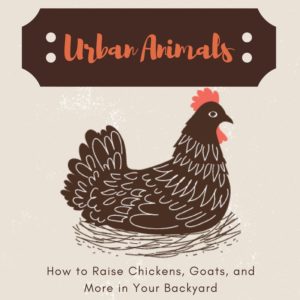
Read more about how to start a farm business:
Urban Backyard Farming for Profit by Mother Earth News
Urban Animals: How to Raise Chickens, Goats and More in Your Backyard – course taught by Kari Spencer
